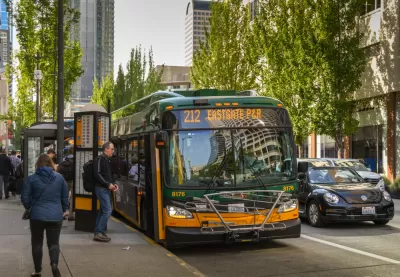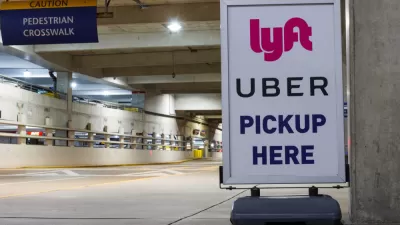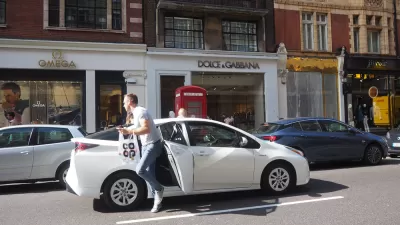Ridehailing companies saw a steep drop in ridership in the city during the pandemic, followed by a slow recovery as their prices increase and demand slows.

Ridehailing companies in Seattle are seeing a slower recovery than in other cities, reports Doug Trumm for The Urbanist. While other parts of the country saw ridehailing grow as an alternative to public transit during the pandemic, Seattle ridership continues to lag compared to pre-pandemic ride volumes. While Seattle ridership for Uber and Lyft hovers at 39 percent compared to 2019, “The companies claim to be at about 70% of normal ridership in most other metropolitan regions.” By contrast, public transit ridership is recovering more quickly. “In April, [King County] Metro ridership clocked in at 49% of its 2019 level.”
Experts attribute the lackluster performance of ridehailing companies to reduced demand and wages that are still too low in a labor market where workers wield more power. “Uber and Lyft have jacked up prices significantly, but most of that is not being passed along to drivers. Instead, the companies are keeping more for themselves in an increasingly desperate attempt to finally turn a profit after a decade of loss-leading growth with little abandon.”
Trumm points to previous arguments made in The Urbanist that “the ridehailing business model appears flawed on a fundamental level for a number of reasons,” including the high cost of car ownership and the failure of the business model to turn a profit as it scaled up. Now, with remote work available to a large percentage of Seattle-area workers, the demand for high-priced ridehailing is even lower.
The article expresses optimism that the slow revitalization of the ridehailing industry may shift more travelers to public transit, but that depends on the ability of public transit to effectively serve Seattleites. “Things like faster and more reliable transit come to mind,” writes Trumm, but notes that transit improvements in the region took a hit from the pandemic as well.
FULL STORY: Ridehailing Sees Bigger Ridership Dip than Transit in Seattle

Maui's Vacation Rental Debate Turns Ugly
Verbal attacks, misinformation campaigns and fistfights plague a high-stakes debate to convert thousands of vacation rentals into long-term housing.

Planetizen Federal Action Tracker
A weekly monitor of how Trump’s orders and actions are impacting planners and planning in America.

In Urban Planning, AI Prompting Could be the New Design Thinking
Creativity has long been key to great urban design. What if we see AI as our new creative partner?

King County Supportive Housing Program Offers Hope for Unhoused Residents
The county is taking a ‘Housing First’ approach that prioritizes getting people into housing, then offering wraparound supportive services.

Researchers Use AI to Get Clearer Picture of US Housing
Analysts are using artificial intelligence to supercharge their research by allowing them to comb through data faster. Though these AI tools can be error prone, they save time and housing researchers are optimistic about the future.

Making Shared Micromobility More Inclusive
Cities and shared mobility system operators can do more to include people with disabilities in planning and operations, per a new report.
Urban Design for Planners 1: Software Tools
This six-course series explores essential urban design concepts using open source software and equips planners with the tools they need to participate fully in the urban design process.
Planning for Universal Design
Learn the tools for implementing Universal Design in planning regulations.
planning NEXT
Appalachian Highlands Housing Partners
Mpact (founded as Rail~Volution)
City of Camden Redevelopment Agency
City of Astoria
City of Portland
City of Laramie





























